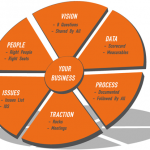
Are there certain, persistent issues inside your organization that just seem to linger? Maybe it’s missed quotas, customer complaints, budget issues or low employee morale, but whatever the problem, it never seems to get solved.
The culprit could be lack of accountability from your leadership team.
“Accountability” among leadership teams can be a slippery slope for entrepreneurs trying to run successful businesses – especially if it’s not absolutely, crystal clear who’s responsible for what in the organization.
This problem is usually systemic, but so is the solution. I suggest trashing the traditional Org Chart and replacing it with an Accountability Chart.
The Accountability Chart identifies the major functions of the business and the specific roles associated with each function. Only after this is crystal clear are people’s names added to the chart. In other words, you identify the essential “seats” in the organization first and then add the “right” people to those seats, not the other way around. The key is that only one person on your leadership team can be accountable for each function.
The value of this tool is that it puts the focus on accountability within key roles and responsibilities. Org Charts don’t provide the same level of clarity.
Let’s use an example to illustrate:
Imagine you own and run a commercial printing business with annual revenue of $5 million. You have 20 employees, including three people on your leadership team. Over the past three months, customer complaints have been trending up. You hold weekly staff meetings, but while everyone understands that this is an important issue and seems genuinely committed to resolving it, you don’t seem to make any progress.
Through the Accountability Chart, you identify the three main functions of the company and the key roles of each:
| Sales/Marketing | Finance | Operations |
| Lead/Manage Team | Lead/Manage Team | Lead/Manage Team |
| Sales/Revenue Goal | AR/AP | Customer Service |
| Selling | Budgeting | Process Management |
| Marketing | HR/Admin | Work Order Completion |
| Sales/Marketing Process | IT | Quality Control |
Then, we add the person accountable for each function:
Sales/Marketing: Kristine Smith
Finance: Bob Jenkins
Operations: Jerry Huntsman
So, if the issue plaguing your company is customer complaints, you can easily look at your chart and determine who is accountable for solving the problem.
Here’s a hint: It’s not the whole team.
You may be tempted (as most are) to say that everyone on the team is responsible for delivering good service. This is true, but if you want to see results, it’s also a problem.
When everyone is accountable, no one is accountable.
In this case, Jerry is responsible, because his name is in the “Operations” box. He owns this number on the company scorecard. When the issue comes up during your staff meeting, you can look straight at Jerry and ask, “Where do we stand with customer complaints, and what are you doing about it?”
Does that mean everyone else is off the hook for improving customer service? Absolutely not! It just means that Jerry is ultimately accountable for fixing the problem, and he creates the team to solve it. This team could include his direct reports, some of his peers on the management team or even you – the CEO. But ultimately, he is responsible for implementing a solution and seeing it through.
Clear accountability leads to powerful results.
The next time you’re addressing a lingering problem, identify who is really responsible for solving it. If in doubt, it may be time to pull out (or create) that Accountability Chart!












































11710 Plaza America Drive, Suite 2000 Reston, VA 20190
703.278.CORE (2673)
This is a great article. It provides great insight, and then practical instructions for easy implementation. Love it! Keep going, and thinkBIG! -Akia Garnett, CEO for Brandbuilder (MasterYourBrand.com)